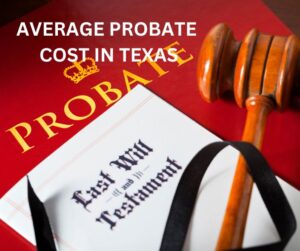Last Updated on March 20, 2024
In the realm of estate planning, a critical aspect often overlooked is the cost of probating a will, especially in a state like Texas where the legalities can be quite intricate. Probate, the legal process through which a deceased person’s will is processed and their assets distributed, incurs various costs that can impact the estate’s value. Understanding these costs is essential for anyone involved in estate planning or for those who might be responsible for executing a will. This blog aims to shed light on the average costs associated with probating a will in Texas and offers guidance on managing these expenses effectively.
Understanding Probate Costs in Texas
Probate costs in Texas can vary widely, but they generally include court fees, attorney fees, executor fees, and other administrative expenses. Court fees are mandatory and fixed, while attorney and executor fees can vary depending on the estate’s complexity and the professional’s rate.
The different types of fees involved in probate are crucial to understand for anyone navigating this process. Court fees are typically a small percentage of the overall cost, while attorney and executor fees can be more significant. These fees compensate for the legal and administrative work required to navigate the probate process, which can be complex and time-consuming.
To get a clearer financial picture of what probating a will might cost, it’s helpful to list out these potential expenses. This will provide a rough estimate of the total cost and help in planning the estate accordingly.
Who Pays for a Probate Lawyer in Texas?
In Texas, the fees for a probate lawyer are typically paid out of the estate’s assets. This means that the costs for legal services associated with the probate process are covered by the estate itself, not by the executor or beneficiaries personally (unless the estate is insolvent, meaning it lacks sufficient assets to cover these costs).

Average Attorney Fees for Probate
In Texas, attorney fees for probate can vary. Some attorneys charge a flat fee, especially for more straightforward cases. Others may charge a percentage of the estate’s value, which is more common in complex cases. Hourly rates are also a possibility, particularly for probate cases that require extensive legal work due to disputes or unusual circumstances.
How these fees are calculated can depend on various factors, including the estate’s size, the complexity of the will, and the attorney’s experience. It’s important for executors and family members to research and compare rates from different probate attorneys to find the most cost-effective option for their situation.
Who Pays Probate Attorney Fees in Texas?
Court Fees and Other Administrative Costs
Apart from attorney fees, there are other costs to consider. Court fees in Texas are set by the state and vary depending on the county. These fees cover the cost of filing the will with the probate court and other administrative expenses associated with the probate process.
In addition to court fees, there may be costs for appraisals, accounting, and other services required to manage and distribute the estate’s assets. The standard court fees for probating a will in Texas can be found on official Texas court websites, and it’s a good idea to check the latest fee schedules to stay updated.
Probate Lawyer Near Me
Factors Affecting Probate Costs
The cost of probate in Texas can be influenced by several factors. The size and complexity of the estate are primary determinants – larger estates with more assets typically incur higher costs. Additionally, if there are disputes among beneficiaries or complications in executing the will, legal fees may increase due to the extra time and resources needed to resolve these issues.
Evaluating the complexity of your or a loved one’s estate can give you a better idea of potential probate costs. Estates with straightforward asset distributions and no anticipated disputes are generally less expensive to probate than those with complex assets or potential conflicts.
Reducing Probate Costs in Texas
To minimize probate costs, effective estate planning is key. Strategies such as creating trusts can help bypass probate for certain assets, thus reducing the overall cost. Additionally, clearly drafted wills and updated beneficiary designations can prevent disputes and streamline the probate process.
Considering estate planning tools that can help reduce future probate costs is a wise step. This might include setting up payable-on-death accounts, joint ownerships, or gifting assets while still alive. Consultation with an estate planning professional can provide customized strategies based on your specific circumstances.
Are There Flat Fee Probate Lawyers in Austin, Texas?
Summary
In summary, the cost to probate a will in Texas can vary significantly based on factors like the estate’s size, complexity, and the professionals involved. Understanding these costs and planning accordingly is a crucial aspect of effective estate management. Regular reviews and updates of your estate plan, along with professional guidance, can help manage these expenses and ensure a smooth probate process. By taking proactive steps now, you can safeguard your legacy and ensure that your final wishes are carried out as intended.
Other Information Online…
